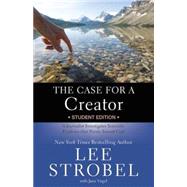
What is included with this book?
| Acknowledgments | 6 | (1) | |
| 1. Science vs. God? | 7 | (4) | |
| 2. Beginning with a Bang: The Evidence of Cosmology | 11 | (14) | |
| 3. Exploring Evolution: A New Look at Old Ideas | 25 | (18) | |
| 4. The Cosmos on a Razor's Edge: The Evidence of Physics and Astronomy | 43 | (18) | |
| 5. Mousetraps and Molecular Machines: The Evidence of Biochemistry | 61 | (12) | |
| 6. DNA and the Origin of Life: The Evidence of Biological Information | 73 | (12) | |
| 7. Decision Time: Is There a Case for a Creator? | 85 | (12) | |
| Notes | 97 | (6) | |
| About the Author | 103 |
The New copy of this book will include any supplemental materials advertised. Please check the title of the book to determine if it should include any access cards, study guides, lab manuals, CDs, etc.
The Used, Rental and eBook copies of this book are not guaranteed to include any supplemental materials. Typically, only the book itself is included. This is true even if the title states it includes any access cards, study guides, lab manuals, CDs, etc.
Excerpted from Case for a Creator: A Journalist Investigates Scientific Evidence That Points Toward God by Lee Strobel
All rights reserved by the original copyright owners. Excerpts are provided for display purposes only and may not be reproduced, reprinted or distributed without the written permission of the publisher.